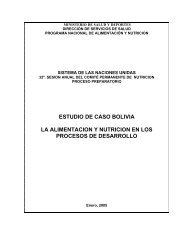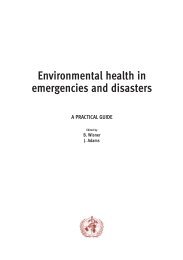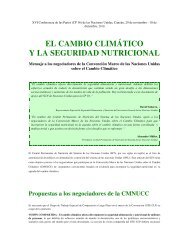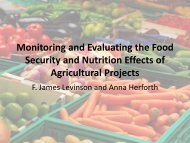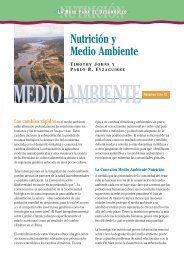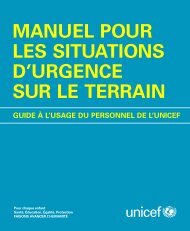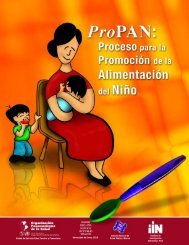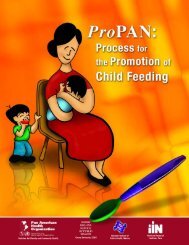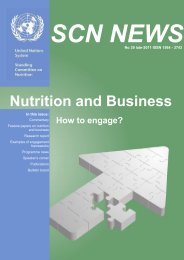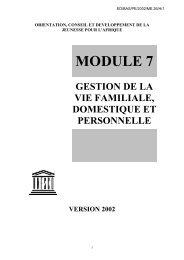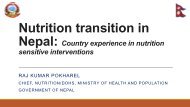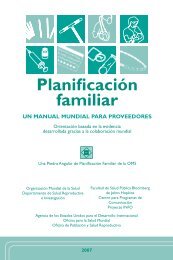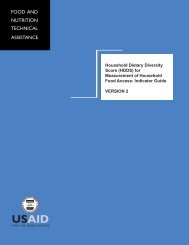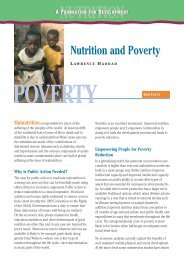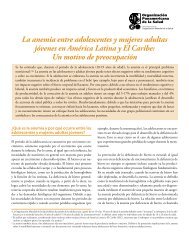SCN News No 36 - UNSCN
SCN News No 36 - UNSCN
SCN News No 36 - UNSCN
Create successful ePaper yourself
Turn your PDF publications into a flip-book with our unique Google optimized e-Paper software.
UNITED NATIONS SYSTEM<br />
STANDING COMMITTEE<br />
ON NUTRITION<br />
The Administrative Committee on Coordination (ACC), which was comprised of the heads of the UN<br />
Agencies, recommended the establishment of the Sub-Committee on Nutrition in 1976, following the World<br />
Food Conference and with particular reference to Resolution V on food and nutrition. This was approved<br />
by the Economic and Social Council of the UN (ECOSOC) by resolution in July 1977. Following the reform<br />
of the ACC in 2001, the ACC/<strong>SCN</strong> was renamed the United Nations System Standing Committee on<br />
Nutrition or simply “the <strong>SCN</strong>”. The <strong>SCN</strong> reports to the Chief Executives Board of the UN, the successor of<br />
the ACC. The UN members of the <strong>SCN</strong> are ECA, FAO, IAEA, IFAD, ILO, UN, UNAIDS, UNDP,<br />
UNEP, UNESCO, UNFPA, UNHCHR, UNHCR, UNICEF, UNRISD, UNU, WFP, WHO and the World<br />
Bank. IFPRI and the ADB are also members. From the outset, representatives of bilateral donor agencies<br />
have participated actively in <strong>SCN</strong> activities as do nongovernmental organizations (NGOs). The <strong>SCN</strong><br />
Secretariat is hosted by WHO in Geneva.<br />
The mandate of the <strong>SCN</strong> is to serve as the UN focal point for promoting harmonized nutrition policies and<br />
strategies throughout the UN system, and to strengthen collaboration with other partners for accelerated and<br />
more effective action against malnutrition. The aim of the <strong>SCN</strong> is to raise awareness of and concern for<br />
nutrition problems at global, regional and national levels; to refine the direction, increase the scale and<br />
strengthen the coherence and impact of actions against malnutrition worldwide; and to promote cooperation<br />
among UN agencies and partner organizations. The <strong>SCN</strong>’s annual meetings have representation from UN<br />
agencies, donor agencies and NGOs; these meetings begin with symposia on subjects of current importance<br />
for policy. The <strong>SCN</strong> brings such matters to the attention of the UN Secretary General and convenes<br />
working groups on specialized areas of nutrition. Initiatives are taken to promote coordinated activities—<br />
interagency programmes, meetings, publications—aimed at reducing malnutrition, reflecting the shared views<br />
of the agencies concerned. Regular reports on the world nutrition situation are issued. Nutrition Policy Papers<br />
are produced to summarize current knowledge on selected topics. <strong>SCN</strong> <strong>News</strong> is published twice a year, and<br />
the NICS (formerly RNIS) is published quarterly. As decided by the <strong>SCN</strong>, initiatives are taken to promote<br />
coordinated activities—interagency programmes, meetings, publications aimed at reducing malnutrition,<br />
primarily in developing countries.<br />
Ann Veneman<br />
Chair<br />
Roger Shrimpton<br />
Secretary<br />
UN <strong>SCN</strong><br />
c/o World Health Organization<br />
20 Avenue Appia, CH 1211 Geneva 27<br />
Switzerland<br />
Telephone: +41-22 791 04 56<br />
Fax: +41-22 798 88 91<br />
scn@who.int<br />
www.unsystem.org/scn<br />
In preparing this issue of the <strong>SCN</strong> <strong>News</strong>, we gratefully acknowledge funding assistance from



